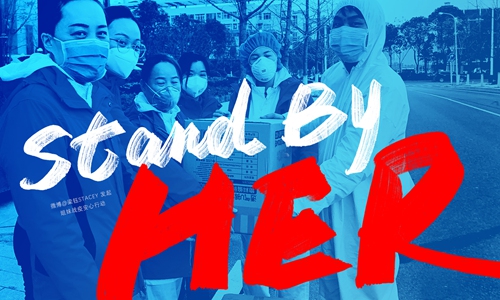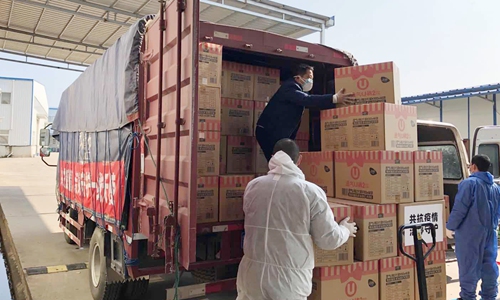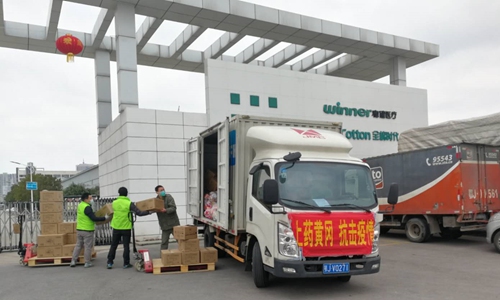HOME >> CHINA
Woman initiates menstrual hygiene item donation for female medical staffers
By Huang Lanlan Source:Global Times Published: 2020/2/11 23:50:11

A publicity picture of the period diaper donation (courtesy of Jiang Jinjing)
A question suddenly rose in Jiang Jinjing's mind when she saw an online video of a nurse putting on a thick and tight protective suit that covered her entire body: how inconvenienced would the nurse be if she was on her period?
To reduce the risks of infection and transmission of the novel coronavirus pneumonia NCP, which has caused 42,747 confirmed cases and 1,017 deaths nationwide as of 11:00 pm Tuesday, medical staffers wear protective suits in treating the NCP patients, which are very difficult and time-consuming to put on and take off.
Doctors and nurses at front-line hospitals in Central China's Hubei Province, therefore, have to go to the bathroom as little as possible to spare more time for the patients, media reports said.
That can be a big headache for female medical staffers on their menstrual periods, Jiang said. "They are too busy to regularly change tampons or pads."

A period diaper manufacturer donates its products to Hubei hospitals (courtesy of Ladycare)
Females matter
A sort of taboo topic decades ago, menstruation is getting wider attention in today's China, with more and more domestic female celebrities including swimming star Fu Yuanhui talking about their periods in public.
Nonetheless, during the fight against the NCP, authorities and donors have to put more essential medical supplies such as masks, disinfectants and protective suits on the priority list, which is reasonable and understandable in Jiang's eyes.
"But I felt worried knowing the lack of menstrual hygiene items has made some front-line female medical staffers uncomfortable," Jiang said, mentioning a photo of a nurse's protective suit stained with menstrual blood that she happened to see on social media.
More than half of front-line medical workers that deal with the NCP patients are females, Jiang estimated. "In many hospitals, nurses even account for over 90 percent," she added. "Their needs are important."
The 24-year-old Shanghainese woman was eager to give a helping hand. She decided to send hospitals period diapers, which are not often used in daily life but can absorb more blood than tampons or pads.
"Wearing period diapers, busy female medical workers don't have to go to the bathroom that frequently," Jiang told the Global Times Monday.
Since February 7 Jiang and her friends have contacted over 50 hospitals in Hubei's most infected Wuhan, Xiaogan and Huanggang cities to ask whether they need period diapers.
The situation was more urgent than Jiang had thought. "In Xiaogan city alone, there were 16,600 female doctors and nurses saying they don't have enough menstrual hygiene products," she recalled.

A period diaper manufacturer donates its products to Hubei hospitals (courtesy of NicePrincess)
Looking for period diapers
Jiang then tried to reach period diaper makers that can provide numerous products in the short term.
Considering Hubei's lockdown during the NCP outbreak, she preferred makers with stocks inside the province.
Ladycare, a Hubei-based female hygiene product manufacturer with headquarters and warehouses in the province's capital Wuhan, soon responded to Jiang.
Having transported nearly 30,000 period diapers to a Wuhan hospital on February 9, the manufacturer is checking its inventory for further donations.
"We have another 30,000 to 40,000 period diapers in stock," Ladycare brand communication director Ding Ming told the Global Times. "We will donate them to more hospitals."
Another Hubei menstrual hygiene product brand, Purcotton, also joined in. To date it has donated 20,000 of its sub-brand NicePrincess period diapers to the female medical staffers in Huanggang hospitals, said NicePrincess's project manager Zhang Li.
"It's time for us to fulfil our social responsibility," Zhang told the Global Times on Monday.
More makers are participating in the donation on Jiang's initiative. As of 5:00 pm Tuesday, Jiang and her friends had cooperated with nine companies that donated over 172,200 period diapers and 7,880 pads to the female medical workers at 26 hospitals across Hubei.
It is not easy to send so many items to hospitals in a quarantined province with strict traffic controls at the moment.
Jiang and her friends are busy contacting local transport vehicles and applying for related transport certificates and licenses, which has cost them lots of time and energy.
"I barely sleep these days," she told the Global Times.
Joint effort
Nonetheless, Jiang said she is somewhat comforted by the unity and kindness that many people have shown in the process.
She mentioned the numerous volunteers in Hubei who help them coordinate with local hospitals, and who enthusiastically spend hours delivering these items for free.
"Some male drivers didn't even know what period diapers are, but they agreed (to transport them) without hesitation after hearing that front-line female medical staffers need them," Jiang smiled.
A Weibo post Jiang wrote on February 7 with her pseudonym Liang Yu, which called for attention to the shortage of menstrual hygiene items at front-line hospitals, had been forwarded over 53,000 times by Tuesday.
Lots of netizens, including over 10 period diaper producers have commented under this post, expressing their willingness to contribute.
As more and more hospitals reach out to her for help, Jiang has built an online volunteer group specifically for the donations. Now the group has 29 members across China who participate in the work including contacting hospitals, negotiating with period diaper manufacturers and coordinating transport.
"From online to offline, from the period diaper donors to the local transporters in Hubei, we are all very united, working together toward a common goal," Jiang said.
"I used to think that 'unity' is just a kind of slogan, but now I truly feel that our country is very promising with so many lovable people," she added.
RELATED ARTICLES:
Posted in: SOCIETY